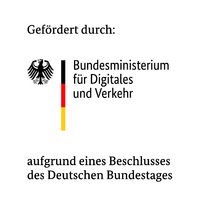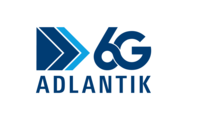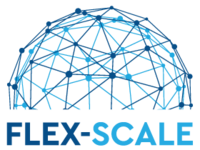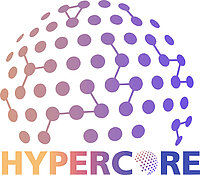Current projects

5G-COMPASS
Convergent Open Mobile and secure Provider-ASSisted 5G indoor and hotspot network
Funded by the Federal Ministry for Digital and Transport
Duration: February 2023 - June 2025


6G-ADLANTIK
Agile, Tunable Laser Architectures for Exploiting the Terahertz Frequency Range and Integrated Photonics for 6G Communication and Measurement Technology
Funded by the Federal Ministry of Education and Research (BMBF)
Duration: November 2022 - October 2025

6G-NETFAB
The 6G-NETFAB project aims to transform the optical fiber communication network into an integrated 6G network structure, known as the Network Fabric, through the use of innovative, distributed switching nodes. The focus lies on separating software from hardware and developing open interfaces. New control algorithms and the development of switches in hardware, software, and signal processing are planned to enable flexible networks with variable data streams.
Funded by the Federal Ministry of Education and Research
Duration: October 2022 – September 2025


6G-RIC
In HHI, we employ Optical neuromorphic computing architectures to mitigate nonlinear distortion due to a long-haul optical implementation as a solution for an energy-efficient as well as low-latency applications in 6G-technologies.
Funded by Federal Ministry of Education and Research (BMBF)
Duration: August 2021 - July 2025

ALLEGRO
HHI will investigate a 100G PON using low-power signal processing and space multiplexing as part of Allegro, demonstrating key functions at the physical layer.
Funded by European Commission
Duration: January 2023 - June 2026

B5G-OPEN
B5G-OPEN targets the design, prototyping and demonstration of a novel end-to-end integrated packet-optical transport architecture based on multi-band optical transmission and switching networks
Co-funded by EU Horizon 2020
Duration: November 2021 – October 2024


ESSENCE-6GM
Research into system concepts and experimental investigations for broadband, high-bit-rate sub-THz MIMO transmission with consideration of economic efficiency and environmental compatibility
Funded by Federal Ministry of Education and Research (BMBF)
Duration: November 2022 - April 2026

FLEX-SCALE
FLEX-SCALE advances disruptive research on complementary optical x-haul network, by utilising ultra-high bandwidth photonic/plasmonic technologies. FLEX-SCALE consortium spans the value chain of industry/academia experts to extend Europe’s leadership in 6G x-haul with offerings of the highest-capacity flexible optoelectronic interfaces and fast switching nodes that fully exploit the optical spatial/spectral resources with the use of novel algorithms and control-plane implementations.
Funded by EU’s HORIZON-JTI-SNS-2022 program (No. 101096909)
Duration: January 2023 - December 2025

FRONT-RUNNER
As part of FRONT-RUNNER, the Photonic Networks department will develop a framework for proactive attack detection together with an end-to-end ML pipeline for real-time execution of the developed algorithms, as well as work closely with the other partners to incorporate their developments into demonstrations in the HHI laboratory.
Funded by Federal Ministry of Education and Research (BMBF)
Duration: January 2023 - December 2025

GreenICT@FMD
Within the scope of GreenICT, the Photonic Networks department will upgrade the optical system laboratory in the hub "energy-saving communication infrastructures" so that it can determine or optimize the energy requirements of optical transmission systems. Furthermore, network operators, system suppliers and component manufacturers will be enabled to minimize energy and resource requirements through load-adaptive system control.
Funded by Federal Ministry of Education and Research (BMBF)
Duration: August 2022 - January 2026


HYPERCORE
In the HYPERCORE project, coordinated by the Fraunhofer Heinrich Hertz Institute (HHI), we are developing a future-proof communication infrastructure for the hyper-connected society. This infrastructure is characterized by increased network capacity, flexibility, and security while maintaining minimal energy consumption.
Funded by Federal Ministry of Education and Research (BMBF)
Duration: July 2024 - June 2027

INSTINCT
The goal of INSTINCT is to augment the capabilities of next-generation mobile networks by developing synergistic Joint Communication and Sensing (JCAS) architectures for tackling current and future technical challenges.
Funded by 6G SNS and the European Union
Duration: January 2024 - December 2026

LINCNET
The LINCNET project aims to further develop wireless communication with light (LiFi) so that it complements 5G communication in medical and industrial applications.
Co-funded by Federal Ministry for Economic Affairs and Climate Action (BMWK)
Duration: January 2022 - December 2024


medCS.5
The medCS.5 project will use various complementary methods, technologies, algorithms and tests to analyze the data security and resilience of 5G infrastructures in the medical sector and formulate recommendations for the design and operation of such networks.
Funded by Federal Office for Information Security (BSI)
Duration: January 2023 - December 2024

OPTIMUX
The OPTIMUX project is investigating trade-offs between different multiplexing strategies. In particular, the focus is on multi-core optical fibers to increase parallel data streams and electrical analog multiplexers to increase the data rate per fiber core.
Funded by the Federal Ministry of Education and Research (BMBF)
Duration: November 2024 - October 2027

OWIMED
Funded by Federal Ministry of Education and Research (BMBF)
Duration: February 2023 - January 2026


PICANT-BOS
Private ad-hoc networks based on 5G and Wi-Fi for emergency response for authorities and organizations with security tasks
Funded by the Federal Ministry of the Interior and for Home Affairs
Duration: January 2025 – June 2026

PONGO
The "Passive Optical Networks of the Next Generation (PONGO)" project aims to develop pioneering technologies for passive optical networks. This will meet the continuously growing demand for higher data rates in optical access networks while simultaneously strengthening and securing technological expertise in Germany in the long term..
Funded by the Federal Ministry of Education and Research
Duration: July 2024 – June 2027

PONTROSA
Funded by the Federal Ministry of Research and Education (BMBF)
Duration: October 2024 - September 2027

PROTEUS-6G
PROTEUS-6G aims to conduct groundbreaking research on complementary technologies that focus on scaling the fronthaul and midhaul (x-haul) segments of 6G networks. The goal is to fully support the potential of emerging 6G services.
Funded by the EU HORIZON-JU-SNS-2024 program
Duration: January 2024 – December 2026
Read more


Q-net-Q
The aim of Q-Net-Q is to integrate Quantum Key distribution (QKD) in backhaul communication networks and Internet Exchange Points (IXPs) by dedicated testbeds.
Funded by Federal Ministry of Education and Research (BMBF)
Duration: March 2023 - August 2025

Quantenrepeater (QR.N)
In an increasingly networked world, the security and reliability of IT infrastructure is of central importance. Cyberattacks, espionage and IT sabotage threaten our critical systems and the stability of free societies on a daily basis. This is precisely where the Quantum Repeater.Net (QR.N) research project comes in: The aim is to lay the foundations for a new era of highly secure communication networks based on quantum physics principles.
Funded by the BMBF
Projektpage of Quantenrepeater.Net
Duration: January 2025 - December 2027


QuNET
Co-funded by Federal Ministry of Education and Research (BMBF) (funding number: 16KIS1082K)
Duration: October 2019 - December 2026


QuNET+ISQKMS
The goal of the project "QuNET+ISQKMS" is the development of a quantum key management system (KMS) that meets highest security requirements.
Funded by Federal Ministry of Education and Research (BMBF)
Duration: October 2022 – September 2025

QuNET+ML
The aim of the project "QuNET - Optimization of QKD networks using machine learning (QuNET+ML)" is to enable the use of quantum key distribution (QKD) in realistic network scenarios.
Funded by the Federal Ministry of Education and Research (BMBF)
Duration: January 2022 – December 2024


QuNET+ProQuake
The goal of the project "Post-Processing for Quantum Key Distribution with Continuous and Discrete Variables (QuNET+ProQuake)" is the development of a platform for QKD post-processing.
Funded by Federal Ministry of Education and Research (BMBF)
Duration: November 2022 - November 2025


SQuaD
The aim of the project "Schirmprojekt Quantum Communication Germany (SQuaD)" in the Innovation Hub is to establish a central point of contact for expertise and infrastructure within the scope of quantum communication in Germany.
Duration: September 2022 – December 2025
SUSTAINET
Sustainable Technologies for Advanced, Resilient, and Energy-Efficient Networks
SUSTAINET is an international research project as part of the CELTIC NEXT initiative. The aim of the project is to develop innovative technologies and solutions that increase the resilience, energy efficiency and sustainability of networks. It thus makes a significant contribution to Europe's digital transformation and technological sovereignty.
Funded by National and European research programs under the CELTIC-NEXT initiative
Duration: January 2025 - December 2027